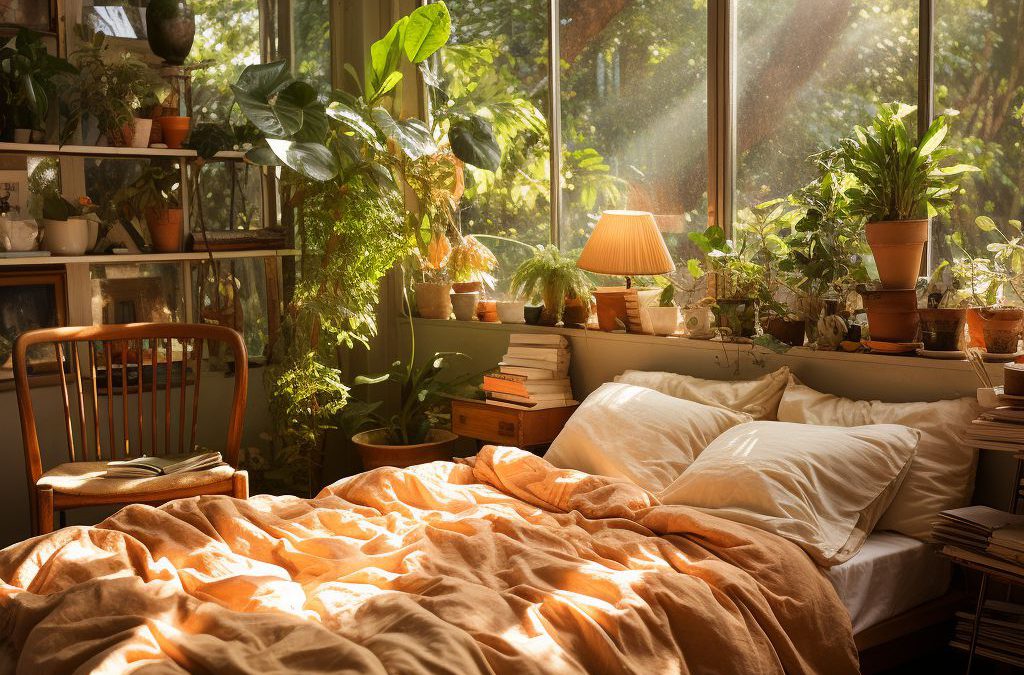If you’re someone who lives in a damp and humid environment, you might be familiar with the difficulty of sleeping comfortably. Feeling uncomfortable and sticky can often lead to a restless night and poor sleep quality. One solution that many people turn to is using a dehumidifier in their bedroom. But, is sleeping with a dehumidifier good for you, or does it bring more harm than good? In this article, we’ll explore the benefits and risks of sleeping with a dehumidifier to help you decide whether it’s a good option for your nightly routine.
Tabe of Contents
- 1. What is a Dehumidifier and How Does it Work?
- 2. The Benefits of Sleeping with a Dehumidifier
- Is Sleeping with a Dehumidifier Good For You?
- 3. Understanding the Effects of High Humidity on Your Health
- 4. Who Should Consider Using a Dehumidifier?
- 5. Choosing the Right Dehumidifier for Your Bedroom
- People Also Ask
- Conclusion
1. What is a Dehumidifier and How Does it Work?
In simple terms, a dehumidifier is an appliance that reduces the amount of moisture in the air by extracting excess water vapor from the atmosphere. It typically consists of a compressor, a fan, and a refrigeration coil that work together to remove excess moisture from the air. As the air enters the dehumidifier, it passes through the refrigeration coil. The coil then condenses the moisture in the air into liquid form, which is then collected in a removable water tank or drained out through a hose.
Types of Dehumidifiers
There are two primary types of dehumidifiers – refrigerant and desiccant. A refrigerant dehumidifier works by cooling the air to extract moisture, while a desiccant dehumidifier uses a moisture-absorbing material such as silica gel to remove moisture from the air.
Benefits of a Dehumidifier
By reducing humidity levels, a dehumidifier can provide numerous benefits. Firstly, it can help to prevent mold and mildew growth, which can cause respiratory problems and allergies. Secondly, it can reduce the amount of dust mites in the air, which are known to trigger allergies. Thirdly, it can help to improve the air quality in your home, which can reduce the risk of respiratory illnesses such as asthma. Lastly, it can help to prevent damage to your home caused by excess moisture, such as peeling paint, warped wood, and musty odors.
2. The Benefits of Sleeping with a Dehumidifier
Is Sleeping with a Dehumidifier Good For You?
Dehumidifiers are becoming increasingly popular household appliances thanks to their ability to regulate humidity levels in the home. But did you know that sleeping with a dehumidifier in your bedroom can have several health benefits?
- Improved Air Quality: A dehumidifier removes excess moisture from the air, reducing the risk of mold, mildew and dust mites. These allergens can trigger respiratory problems, leading to breathing difficulties, coughing, and wheezing, especially in people with asthma or allergies. By ensuring optimal humidity levels, you can enjoy cleaner, fresher air, making it easier to breathe and sleep peacefully.
- Reduced Risk of Infections: Humid environments can facilitate the growth of bacteria and viruses, increasing the risk of infections. By using a dehumidifier in your bedroom, you can lower the humidity levels and create an inhospitable environment for these harmful microorganisms. This can help you stay healthy and reduce the risk of catching colds, flu or other infections.
- Reduced Skin Irritation: High humidity levels can also cause skin irritation, especially if you have sensitive skin. Moisture can get trapped in your clothes and bedding, leading to rashes, itching, and fungal infections. By using a dehumidifier, you can maintain optimal humidity levels and reduce the risk of skin irritation, ensuring a good night’s sleep and comfortable, healthy skin.
If you suffer from allergies, skin irritation, respiratory problems, or are simply looking for a better and healthier sleep, consider investing in a dehumidifier for your bedroom.
3. Understanding the Effects of High Humidity on Your Health
Before we delve into the benefits of sleeping with a dehumidifier, it’s important to understand the negative effects of high humidity on your health. High humidity levels in the bedroom can have a detrimental effect on your respiratory system, skin, and overall well-being.
Respiratory problems:
Excess moisture in the air can lead to the growth of mold, mildew, and dust mites – all of which are common allergens and can trigger respiratory problems such as allergies, asthma, and coughing.
In addition, high humidity levels make it difficult for our bodies to regulate temperature, which can cause discomfort, difficulty breathing, and can lead to dehydration.
Skin issues:
High humidity can also cause skin problems such as rashes, eczema, and acne due to excess sweat and bacteria growth.
Besides, it can make your room feel sticky and unpleasant due to perspiration and moisture.
By understanding the negative effects of high humidity levels on your health, it becomes clearer as to why you might want to consider using a dehumidifier in your bedroom to keep the air dry and comfortable.
4. Who Should Consider Using a Dehumidifier?
If you live in an area that experiences high humidity levels, you might want to consider using a dehumidifier in your bedroom. But who exactly should use one? Here are a few groups of people who might find a dehumidifier beneficial:
- Allergy sufferers: High levels of humidity can trigger allergic reactions, especially for those who are sensitive to dust mites, mold, or mildew. A dehumidifier can help to reduce the number of allergens in the air, providing relief for sufferers.
- Asthmatics: Those who suffer from asthma often experience increased symptoms during humid weather. A dehumidifier can help to reduce the risk of asthma attacks by keeping humidity levels low.
- Individuals with respiratory problems: High humidity levels can lead to an increase in respiratory difficulties for those with lung conditions such as COPD or emphysema. The use of a dehumidifier can help to alleviate symptoms and improve breathing.
- Hot sleepers: If you find that you sweat excessively during the night, it might be due to high humidity levels in your bedroom. A dehumidifier can help to keep the air dry and cool, making it easier for you to sleep comfortably.
While these groups of people may find a dehumidifier particularly beneficial, anyone can benefit from sleeping in a less humid environment. If you’re not sure whether a dehumidifier is right for you, consider speaking with your doctor or a qualified air quality professional.
5. Choosing the Right Dehumidifier for Your Bedroom
Once you have decided to use a dehumidifier in your bedroom, it’s important to choose the right one to suit your needs. Not all dehumidifiers are made equal and there are certain factors you should consider before making a purchase.
Size and Capacity
The first consideration is the size and capacity of the dehumidifier. You’ll want to choose one that’s appropriate for the size of your bedroom. A larger room will require a larger capacity dehumidifier, and vice versa. Most dehumidifiers will list their capacity in pints, which refers to the amount of moisture they can extract from the air in a 24-hour period.
Noise Level
Another important factor to consider is the noise level of the dehumidifier. If you are a light sleeper, you’ll want to choose one that operates quietly. Some dehumidifiers are designed to operate at a lower sound level so that they won’t disturb your sleep.
Energy Efficiency
Energy efficiency is another important factor to consider. You don’t want a dehumidifier that’s going to add to your energy bills each month. Look for a dehumidifier that has an Energy Star rating. This means that it’s more energy-efficient than other models on the market.
Features
Finally, consider the features that the dehumidifier offers. Some models have additional features such as auto-shutoff when the water tank is full, digital displays, and multiple fan speeds. Think about what features are important to you and choose a dehumidifier that meets your needs.
- Consider the size and capacity of the dehumidifier
- Choose a dehumidifier with a quiet noise level
- Look for an Energy Star rating for energy efficiency
- Think about additional features that may be important to you
People Also Ask
What are the benefits of sleeping with a dehumidifier?
A dehumidifier can help regulate the humidity levels in your room, which can lead to better indoor air quality and a more comfortable sleep. It can also help reduce the growth of mold and mildew, which can cause respiratory issues.
Can sleeping with a dehumidifier make you sick?
Sleeping with a dehumidifier can be beneficial for some people, but it can also cause health problems if not maintained properly. If the dehumidifier is not cleaned or emptied regularly, it can release harmful bacteria and allergens into the air, leading to respiratory problems and other health concerns.
What are the best dehumidifiers for a bedroom?
The best dehumidifiers for a bedroom should be quiet and energy-efficient. Look for models with a built-in humidistat, which will shut off the dehumidifier when the desired humidity level is reached. Popular brands for bedroom dehumidifiers include Frigidaire, hOmeLabs, and Ivation.
Is it safe to leave a dehumidifier on all night?
It is generally safe to leave a dehumidifier on all night, as long as it is properly maintained and does not overheat. Some models are designed to operate continuously, while others have an automatic shut-off feature when the water tank is full.
What is the ideal humidity level for sleeping?
The ideal humidity level for sleeping is between 30 and 50%. Too much or too little humidity can cause discomfort, respiratory problems, and other health issues. Using a dehumidifier can help regulate the humidity levels in your bedroom, leading to a more comfortable and restful sleep.
Conclusion
Sleeping with a dehumidifier can be beneficial for those who suffer from allergies or respiratory problems, as it can help regulate the humidity levels in your room and reduce the growth of mold and mildew. However, it is important to properly maintain the dehumidifier and choose the right model for your needs. As with any appliance, there are potential risks associated with leaving a dehumidifier on all night, so it is important to follow manufacturer guidelines and use the appliance safely.

AC Replacement Specialist
Wyatt specializes in managing the replacement process for older or malfunctioning units. His focus on seamless transitions ensures minimal disruption during upgrades.

